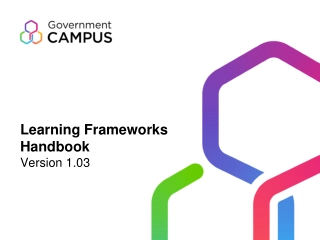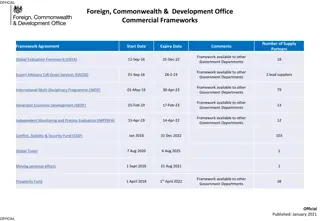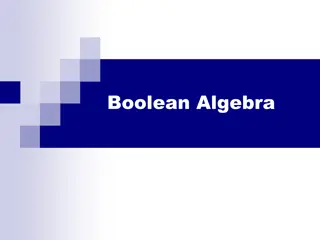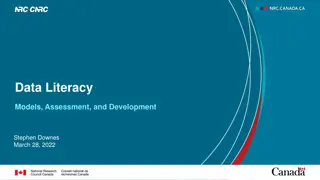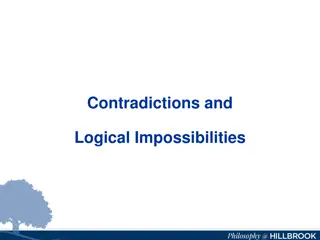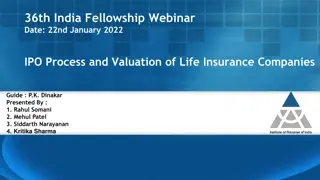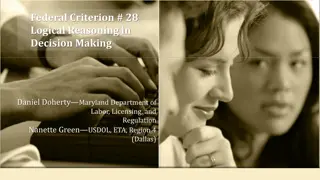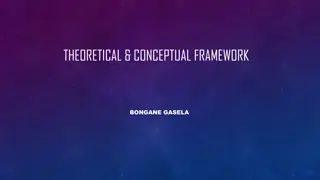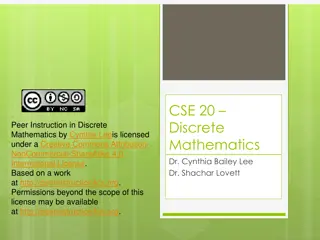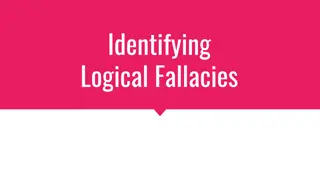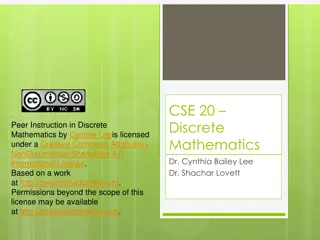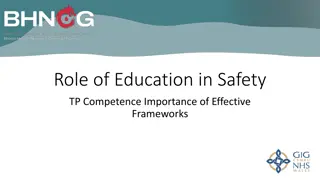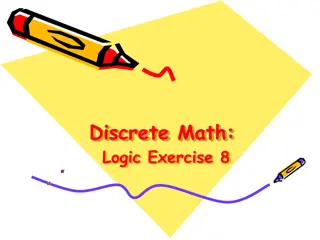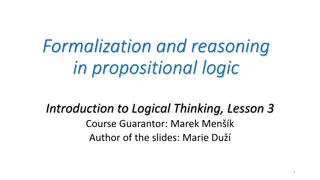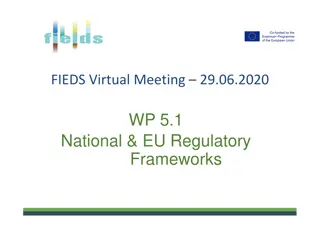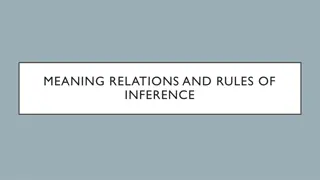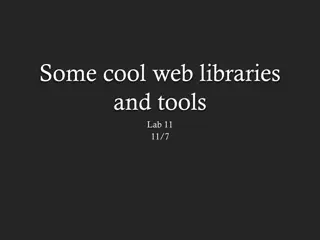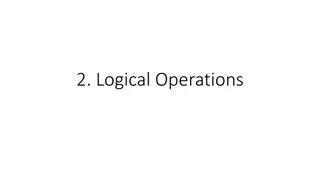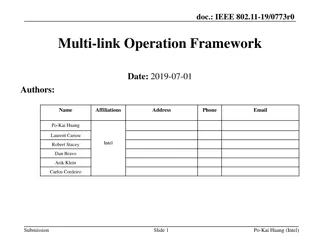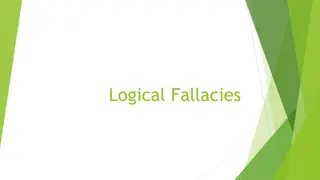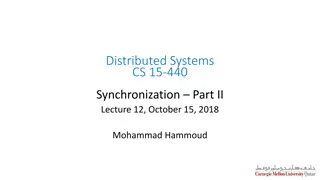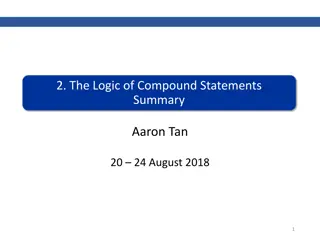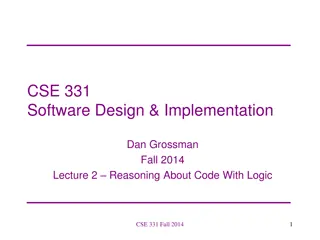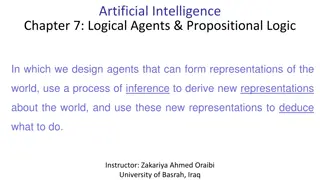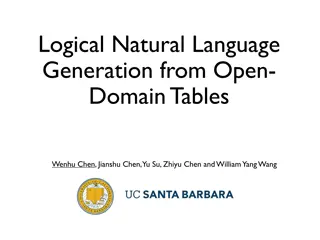Learning Frameworks Handbook
This comprehensive handbook provides an overview of the learning frameworks designed to enhance training and development within the Civil Service. It covers service benefits, governance, available resources, and valuable insights on maximizing the impact of learning frameworks. The handbook aims to
1 views • 59 slides
Understanding Logical Form and Equivalence in Conditional Statements
Delve into the intricacies of logical form, equivalence, and compound statements in the realm of propositional logic. Explore valid and invalid arguments, conditional statements, and the logic of compound statements with puzzles to sharpen your logical reasoning skills. Unravel scenarios like determ
4 views • 81 slides
Understanding the Importance of Practice Frameworks in Social Work
Social work practice relies on legal and theoretical frameworks to guide practitioners in providing effective support. These frameworks serve as tools for developing and evaluating impactful interventions. Legislation shapes interpretations in child protection cases, emphasizing diverse parenting st
4 views • 19 slides
Exploring Lesson Planning Frameworks in ELT
Delve into the world of English Language Teaching (ELT) by identifying and analyzing different lesson frameworks, considering their stages, evaluating their suitability, and understanding the commonalities and variations among popular frameworks like PPP, TTT, and more. Engage in group activities to
6 views • 15 slides
Which and How of Cybersecurity Frameworks
Navigate the complex landscape of cybersecurity frameworks with expert guidance on identifying the perfect fit for your organization. Explore various frameworks such as IRAP, SOC2, ISO 27001, and learn the advantages of selecting the right one. Understand the importance of compliance, certification,
3 views • 41 slides
Foreign, Commonwealth & Development Office Commercial Frameworks Overview
This document provides a comprehensive overview of the commercial frameworks managed by the Foreign, Commonwealth & Development Office, including details such as the number of supply partners, agreement start and expiry dates, and availability to other government departments. It covers various frame
0 views • 10 slides
Logical Expressions and Symbolism in Sentential Logic
Understanding sentential logic, logical expressions, and symbols through examples of logical reasoning and inference. Explore the concepts of logical OR, AND, negation, and the complexities of inclusive and exclusive logic in various scenarios.
1 views • 33 slides
Understanding Boolean Algebra and Logical Statements
Introduction to Boolean algebra, logical statements, and compound statements. Explore the concepts of Boolean variables, logical operators, writing conventions, equivalence in Boolean algebra, and truth tables. Learn how to analyze and evaluate logical expressions using truth tables.
1 views • 25 slides
Overview of National Development Manager's Achievements in Education Frameworks
National Development Manager Frank Quinn has led successful adaptations and updates in various education frameworks, emphasizing progression and recognition for learners. The frameworks cover a wide range of sectors from accountancy to social services, showcasing repackaging of units for customized
0 views • 17 slides
Understanding Data Literacy: Models, Assessment, and Competency Frameworks
Data literacy is the ability to collect, manage, evaluate, and apply data critically. Various frameworks and models exist, such as competency models, evaluation frameworks, and teaching frameworks developed by organizations like the National Research Council of Canada. Core skills and competencies u
1 views • 79 slides
Exploring Contradictions and Logical Impossibilities
Explore a series of paradoxes and logical puzzles, ranging from being in two places at once to time travel conundrums. Discover the concept of contradictions and logical impossibilities through thought-provoking scenarios and riddles. Dive into the realm of impossibilities and challenge your underst
1 views • 6 slides
Valuation Frameworks and Preparing for IPO in Indian Life Insurance Industry
Explore the differences between embedded valuation frameworks used by listed insurers in India versus internal frameworks, along with discussions on strategic decisions for IPO readiness, reasons for high valuations, and comparability issues. Dive into calculating Embedded Value and strategic consid
1 views • 45 slides
Enhancing Logical Reasoning in Decision Making Process
Federal Criterion #28 emphasizes the importance of stating logical reasons for decisions that align with findings of fact and conclusions of law. This criterion is key to ensuring fairness and accuracy in legal analysis. The scoring criteria, national appeals review results, and ways to improve scor
1 views • 8 slides
Understanding Theoretical and Conceptual Frameworks in Research
The theoretical and conceptual frameworks in research play vital roles by grounding studies in theoretical constructs, enhancing rigor and empiricism, and guiding the research process. The theoretical framework provides a blueprint based on existing theories, guiding researchers in developing their
0 views • 12 slides
Addressing Child Marriages in Lesotho: Analysis, Frameworks, and Laws
This report delves into the issue of child marriages in Lesotho, covering situation analysis, key facts, normative frameworks, and laws in the country. It addresses the minimum legal age of consent to marriage, societal attitudes, and relevant international treaties. The current situation in Lesotho
4 views • 12 slides
Understanding Boolean Algebra and Logical Statements
Boolean Algebra allows for formalizing logical reasoning using variables that can be either true or false. It involves logical statements, compound expressions, logical operators like AND, OR, NOT, writing conventions, equivalence, and truth tables to determine the truth values of statements. By und
0 views • 25 slides
Understanding Logical Connectives in Discrete Mathematics
Explore the world of propositional logic and truth tables in discrete mathematics through a peer-instruction approach. Learn about basic logical connectives, new connectives, complex formulas, operator precedence, and the nuances of implication (implies) with engaging examples. Delve into scenarios
0 views • 14 slides
Understanding Propositional Logic and Logical Operators
Learn about propositional logic, statements, logic operators, compound statements, exclusive-or, logical equivalence, and writing logical formulas for truth tables. Explore how to create compound statements for exclusive-or using different approaches and ensure logical equivalence. Enhance your know
0 views • 26 slides
Understanding Logical Relations in Programming Languages
Explore the concept of logical relations in programming languages, focusing on the relation between high-level and low-level programs. Learn about contextual equivalence, its benefits and limitations, and how logical relations offer a robust framework for defining program equivalence. Discover why l
1 views • 18 slides
Understanding Laws of Logic and Logical Reasoning
Laws of logic play a crucial role in reasoning and making deductions. This comprehensive guide explains the use of contrapositives, examples of conditional statements, and the significance of laws like the Law of Syllogism. Understanding these principles helps in effectively analyzing statements and
0 views • 8 slides
Introduction to Symbolic Logic: Understanding Logical Inferences
Logic is the study of reasoning methods to distinguish between correct and incorrect arguments. Symbolic Logic involves representing logic symbolically for easier understanding and manipulation. Logical inferences help in making decisions based on reasoning chains. The content discusses the use of l
1 views • 28 slides
Identifying Logical Fallacies in Sources: Presentation Assignment
Learn to identify logical fallacies in various sources by analyzing passages and applying the Logical Fallacy Referee tool. Work in pairs to select sources, identify fallacies, and present annotated examples to the class.
0 views • 7 slides
Peer Instruction in Discrete Mathematics
Explore the world of discrete mathematics with Dr. Cynthia Bailey Lee and Dr. Shachar Lovett through peer instruction. Dive into topics like step-by-step equivalence proofs and the equivalence of logical operators. Discover the different methods to show propositions are equivalent and delve into log
0 views • 14 slides
Importance of Competency Frameworks in Ensuring Safety and Excellence in Education
Competency frameworks play a crucial role in enhancing clarity of performance expectations and linking individual skills to organizational success. Specifically focusing on the Transfusion Practitioner role in Wales, these frameworks set out criteria for knowledge and skills, aid in self-assessment,
0 views • 10 slides
Propositions and Logical Connectives Exercise Solutions
In this exercise, propositions involving grizzly bears, hiking safety, and ripe berries are formulated using logical connectives. Solutions are provided for various scenarios including conjunctions, conditionals, biconditionals, and more. The explanations offer a structured approach to understanding
0 views • 6 slides
Introduction to Propositional Logic: Formalization and Reasoning
Understanding formalization in propositional logic involves replacing atomic propositions with propositional variables and natural language connectives with logical connectives. The process abstracts from internal proposition structure, reducing meaning to True or False. The language allows formaliz
0 views • 18 slides
The Logical Structure of Classical and Quantum Mechanics
The paper explores the common logical structure shared between classical and quantum mechanics, emphasizing the non-distributive lattice embedded in a distributive one. It discusses how all physical theories must adhere to this structure, incorporating topology, Heyting algebra, Boolean algebra, and
1 views • 36 slides
Introduction to Logical Thinking in Computer Science at VSB - Technical University of Ostrava
This course introduces the concept of logical thinking in Computer Science at VSB - Technical University of Ostrava. Topics include valid arguments, deductive reasoning, and the science of correct reasoning. Requirements for passing the course include written tests and exams with specified grade ran
0 views • 18 slides
National and EU Regulatory Frameworks for Training and Innovation Opportunities
Start/end date for WP5.1 initiative is M7-M24, led by CONFAGRI.PT and partners. The project aims to prepare the roll-out of deliverables at national and regional levels, focusing on regulatory frameworks, sustainability plan, and stakeholder engagement. Various organizations contribute to provide EU
0 views • 7 slides
Understanding Meaning, Relations, and Rules of Inference in Logic
Exploring the concept of meaning, relations, and rules of inference in logic through the use of truth tables to evaluate logical formulas. Discover how tautologies and contradictions are identified, and how logical operators influence the truth values of propositions. Delve into examples that showca
0 views • 24 slides
Overview of Web Libraries, Tools, and Frameworks for Building Web Apps
Explore various client-side and server-side web libraries, tools, and frameworks such as Angular, Ember, Rails, Express, jQuery, d3, and more. Learn about the importance of web app frameworks, the challenges they solve, and considerations for choosing between server-side and client-side implementati
0 views • 57 slides
Understanding Logical Operations and Their Applications
Logical operators such as AND, OR, NOT, and XOR play a crucial role in programming and control systems. They are used to combine logical expressions and make decisions based on certain conditions. By utilizing truth tables, these operators help in solving problems efficiently. This article explores
0 views • 24 slides
IEEE 802.11-19/0773r0 Multi-link Operation Framework Summary
The document discusses the multi-link operation framework for IEEE 802.11-19/0773r0, focusing on load balancing and aggregation use cases. It introduces terminology related to multi-link logical entities and provides examples of multi-link AP and non-AP logical entities. The framework considers stee
0 views • 16 slides
Understanding Logical Fallacies: Common Types and Examples
Logical fallacies are errors in reasoning that can undermine the validity of arguments. This content covers various types of fallacies such as circular logic, either/or fallacy, oversimplification, overgeneralization, stereotyping, and ad hominem attacks. Examples and explanations are provided for e
0 views • 16 slides
Understanding Distributed System Synchronization and Logical Clocks
Continuing from the previous lecture on time synchronization, this session delved into logical clock synchronization, mutual exclusion, and election algorithms in distributed systems. Logical clocks, such as Lamport's Clock and Vector Clock, play a crucial role in defining the order of events withou
0 views • 33 slides
Understanding Compound Statements in Logic
The summary discusses the logic of compound statements, covering logical form, equivalence, tautologies, contradictions, conditional statements, valid and invalid arguments, and more. It explains the definitions of statements, negation, conjunction, disjunction, statement form, logical equivalence,
0 views • 12 slides
Logical Reasoning in Software Design and Implementation
Logical reasoning in software development involves determining the truth of facts as a program runs under specific assumptions. This process complements testing by allowing programmers to reason about classes of inputs/states and verify program correctness. Hoare Logic is introduced as a method for
0 views • 35 slides
Understanding Logical Agents and Propositional Logic in AI
Designing logical agents involves forming representations of the world, using inference for deriving new insights, and deducing actions based on these representations. Knowledge Base (KB) is a crucial component, comprising known facts and current percepts to infer hidden states. Propositional logic,
0 views • 23 slides
Introduction to Logical Thinking: Science of Correct Reasoning
Logic, the science of correct reasoning, explores ways to infer conclusions from assumptions and validate arguments. This course introduces logic as a tool for analyzing arguments, automating processes, and enhancing communication clarity. Through classic logic variants like propositional and predic
0 views • 30 slides
Advancements in Logical Natural Language Generation from Open-Domain Tables
Cutting-edge research in logical natural language generation (NLG) is transforming the field by moving beyond traditional surface realization to generate summarized text, conclude trends, and apply logical and mathematical operations. By addressing limitations such as lack of logical inference, summ
0 views • 33 slides
